中元节活动英语
浅析如何用英文讲述中元节起源与习俗
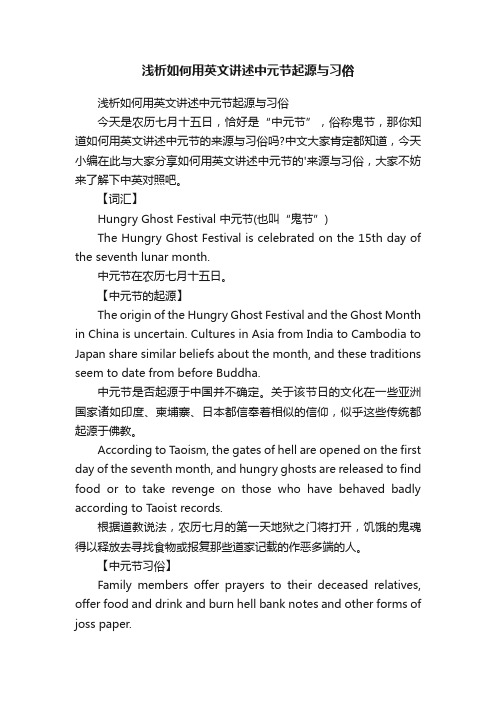
浅析如何用英文讲述中元节起源与习俗浅析如何用英文讲述中元节起源与习俗今天是农历七月十五日,恰好是“中元节”,俗称鬼节,那你知道如何用英文讲述中元节的来源与习俗吗?中文大家肯定都知道,今天小编在此与大家分享如何用英文讲述中元节的'来源与习俗,大家不妨来了解下中英对照吧。
【词汇】Hungry Ghost Festival 中元节(也叫“鬼节”)The Hungry Ghost Festival is celebrated on the 15th day of the seventh lunar month.中元节在农历七月十五日。
【中元节的起源】The origin of the Hungry Ghost Festival and the Ghost Month in China is uncertain. Cultures in Asia from India to Cambodia to Japan share similar beliefs about the month, and these traditions seem to date from before Buddha.中元节是否起源于中国并不确定。
关于该节日的文化在一些亚洲国家诸如印度、柬埔寨、日本都信奉着相似的信仰,似乎这些传统都起源于佛教。
According to Taoism, the gates of hell are opened on the first day of the seventh month, and hungry ghosts are released to find food or to take revenge on those who have behaved badly according to Taoist records.根据道教说法,农历七月的第一天地狱之门将打开,饥饿的鬼魂得以释放去寻找食物或报复那些道家记载的作恶多端的人。
中元节英语 作文
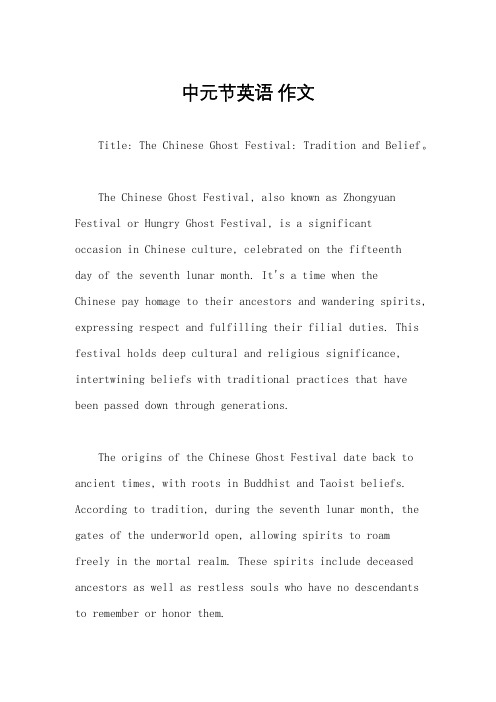
中元节英语作文Title: The Chinese Ghost Festival: Tradition and Belief。
The Chinese Ghost Festival, also known as Zhongyuan Festival or Hungry Ghost Festival, is a significantoccasion in Chinese culture, celebrated on the fifteenthday of the seventh lunar month. It's a time when theChinese pay homage to their ancestors and wandering spirits, expressing respect and fulfilling their filial duties. This festival holds deep cultural and religious significance, intertwining beliefs with traditional practices that have been passed down through generations.The origins of the Chinese Ghost Festival date back to ancient times, with roots in Buddhist and Taoist beliefs. According to tradition, during the seventh lunar month, the gates of the underworld open, allowing spirits to roamfreely in the mortal realm. These spirits include deceased ancestors as well as restless souls who have no descendants to remember or honor them.One of the central beliefs of the Ghost Festival is the idea of filial piety, the virtue of respect for one's parents, elders, and ancestors. Chinese people believe that by honoring and remembering their ancestors during this time, they can bring blessings to their families and ensure the well-being of their departed loved ones in theafterlife. Thus, families gather to perform rituals and ceremonies to pay homage to their ancestors, offering food, burning incense, and lighting lanterns to guide the spirits back to the underworld.During the Ghost Festival, various customs andactivities are observed to appease and honor the spirits. One common practice is the setting up of temporary altarsin homes and temples, adorned with offerings such as fruits, sweets, and paper money known as "spirit money." These offerings are believed to provide comfort and sustenance to the visiting spirits. Additionally, elaborate rituals, including the burning of incense and joss paper, are conducted to show reverence and seek blessings from the ancestors.Another significant aspect of the Ghost Festival is the performance of traditional Chinese operas and theatrical productions known as "ghost plays." These performancesdepict stories of the afterlife and supernatural encounters, serving both as entertainment and as a form of spiritual expression. Through these dramas, people seek to appeaseand communicate with the spirits, hoping for protection and good fortune.One distinctive feature of the Ghost Festival is the practice of releasing "ghost lanterns" or "water lanterns" into rivers and lakes. These lanterns, often made of paper and lit with candles, are believed to guide the spiritsback to the underworld and bring blessings to the living.It's a beautiful and symbolic gesture of letting go and sending wishes to both the living and the departed.In contemporary times, the Chinese Ghost Festival continues to be observed with reverence and solemnity,albeit with some modern adaptations. While traditionalrituals and customs remain prevalent, urbanization andchanging lifestyles have led to variations in how thefestival is celebrated. Nevertheless, the core values offilial piety, ancestor veneration, and spiritual connection remain at the heart of the Ghost Festival.In conclusion, the Chinese Ghost Festival is a time-honored tradition that reflects the rich cultural heritage and spiritual beliefs of the Chinese people. It serves as a reminder of the importance of family, remembrance, and reverence for the departed. Through its rituals and customs, the Ghost Festival bridges the gap between the living and the dead, fostering a sense of continuity and connection across generations.。
中元节英文简介-The Ghost Festival
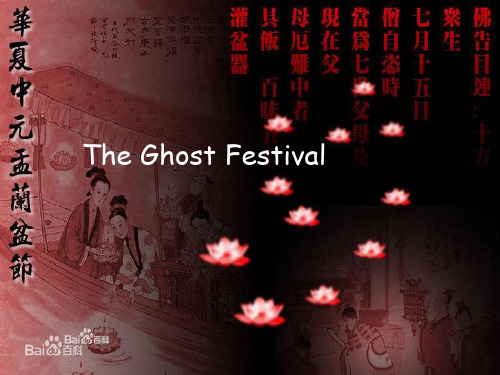
1.A brief introduction 2.The origin of the Ghost Festival 3.Main activities
In Chinese tradition, the fifteenth day (in someplace of south China it is the fourteenth day)of the seventh month in the lunar calendar is called the Ghost Festival, and the seventh lunar month in general is regarded as the Ghost Month, in which ghosts and spirits, including those of the deceased ancestors, come out from the lower realm。In Taoism this festival is also called "Zhongyuan Festival",and in Buddism it is called "Obon Festival". It is also called"the Mid-July day" among Chinese people. It is believed during the seventh lunar month, the gates of hell are thrown open, releasing hungry ghosts to wander the earth in search of food and taking revenge upon those who wronged them in life. So this festival is also called " the Hungry Ghost Festival ".
中元节英语作文
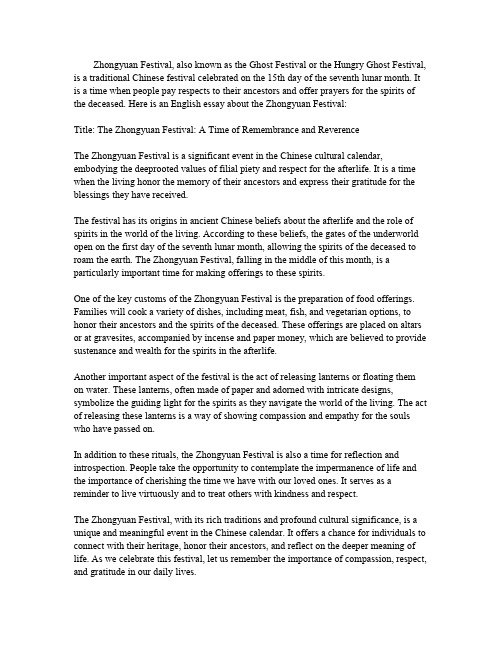
Zhongyuan Festival,also known as the Ghost Festival or the Hungry Ghost Festival, is a traditional Chinese festival celebrated on the15th day of the seventh lunar month.It is a time when people pay respects to their ancestors and offer prayers for the spirits of the deceased.Here is an English essay about the Zhongyuan Festival:Title:The Zhongyuan Festival:A Time of Remembrance and ReverenceThe Zhongyuan Festival is a significant event in the Chinese cultural calendar, embodying the deeprooted values of filial piety and respect for the afterlife.It is a time when the living honor the memory of their ancestors and express their gratitude for the blessings they have received.The festival has its origins in ancient Chinese beliefs about the afterlife and the role of spirits in the world of the living.According to these beliefs,the gates of the underworld open on the first day of the seventh lunar month,allowing the spirits of the deceased to roam the earth.The Zhongyuan Festival,falling in the middle of this month,is a particularly important time for making offerings to these spirits.One of the key customs of the Zhongyuan Festival is the preparation of food offerings. Families will cook a variety of dishes,including meat,fish,and vegetarian options,to honor their ancestors and the spirits of the deceased.These offerings are placed on altars or at gravesites,accompanied by incense and paper money,which are believed to provide sustenance and wealth for the spirits in the afterlife.Another important aspect of the festival is the act of releasing lanterns or floating them on water.These lanterns,often made of paper and adorned with intricate designs, symbolize the guiding light for the spirits as they navigate the world of the living.The act of releasing these lanterns is a way of showing compassion and empathy for the souls who have passed on.In addition to these rituals,the Zhongyuan Festival is also a time for reflection and introspection.People take the opportunity to contemplate the impermanence of life and the importance of cherishing the time we have with our loved ones.It serves as a reminder to live virtuously and to treat others with kindness and respect.The Zhongyuan Festival,with its rich traditions and profound cultural significance,is a unique and meaningful event in the Chinese calendar.It offers a chance for individuals to connect with their heritage,honor their ancestors,and reflect on the deeper meaning of life.As we celebrate this festival,let us remember the importance of compassion,respect, and gratitude in our daily lives.。
有关中元节的详细英文介绍
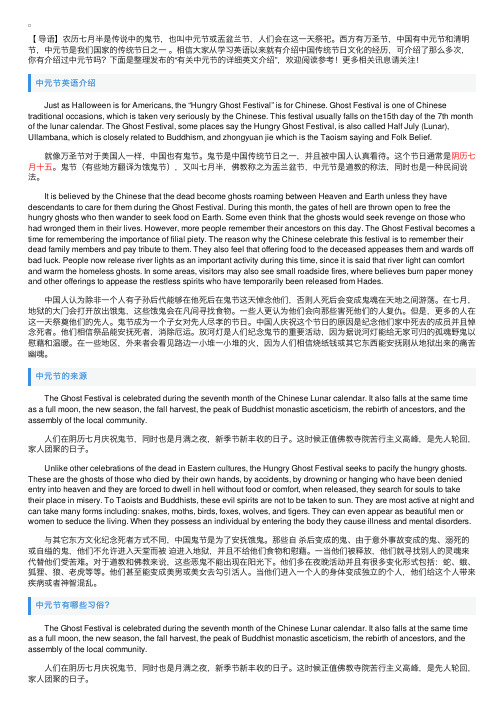
【导语】农历七⽉半是传说中的⿁节,也叫中元节或盂盆兰节,⼈们会在这⼀天祭祀。
西⽅有万圣节,中国有中元节和清明节,中元节是我们国家的传统节⽇之⼀。
相信⼤家从学习英语以来就有介绍中国传统节⽇⽂化的经历,可介绍了那么多次,你有介绍过中元节吗?下⾯是整理发布的“有关中元节的详细英⽂介绍”,欢迎阅读参考!更多相关讯息请关注!中元节英语介绍 Just as Halloween is for Americans, the “Hungry Ghost Festival” is for Chinese. Ghost Festival is one of Chinese traditional occasions, which is taken very seriously by the Chinese. This festival usually falls on the15th day of the 7th month of the lunar calendar. The Ghost Festival, some places say the Hungry Ghost Festival, is also called Half July (Lunar), Ullambana, which is closely related to Buddhism, and zhongyuan jie which is the Taoism saying and Folk Belief. 就像万圣节对于美国⼈⼀样,中国也有⿁节。
⿁节是中国传统节⽇之⼀,并且被中国⼈认真看待。
这个节⽇通常是阴历七⽉⼗五。
⿁节(有些地⽅翻译为饿⿁节),⼜叫七⽉半,佛教称之为盂兰盆节,中元节是道教的称法,同时也是⼀种民间说法。
It is believed by the Chinese that the dead become ghosts roaming between Heaven and Earth unless they have descendants to care for them during the Ghost Festival. During this month, the gates of hell are thrown open to free the hungry ghosts who then wander to seek food on Earth. Some even think that the ghosts would seek revenge on those who had wronged them in their lives. However, more people remember their ancestors on this day. The Ghost Festival becomes a time for remembering the importance of filial piety. The reason why the Chinese celebrate this festival is to remember their dead family members and pay tribute to them. They also feel that offering food to the deceased appeases them and wards off bad luck. People now release river lights as an important activity during this time, since it is said that river light can comfort and warm the homeless ghosts. In some areas, visitors may also see small roadside fires, where believes burn paper money and other offerings to appease the restless spirits who have temporarily been released from Hades. 中国⼈认为除⾮⼀个⼈有⼦孙后代能够在他死后在⿁节这天悼念他们,否则⼈死后会变成⿁魂在天地之间游荡。
中国传统节日及活动英译
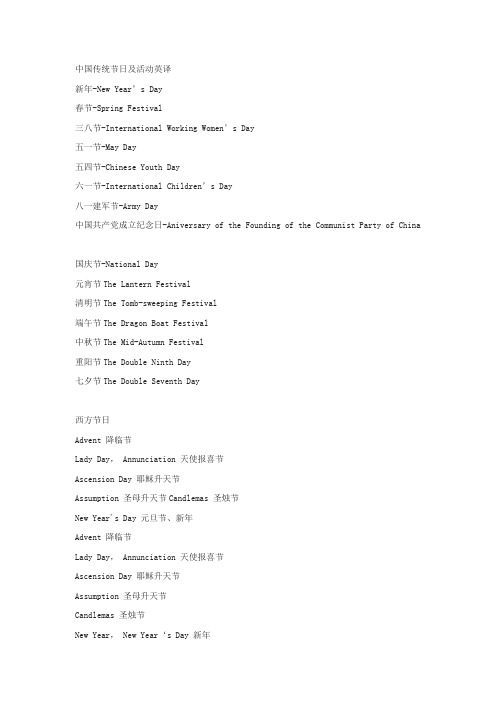
中国传统节日及活动英译新年-New Year’s Day春节-Spring Festival三八节-International Working Women’s Day五一节-May Day五四节-Chinese Youth Day六一节-International Children’s Day八一建军节-Army Day中国共产党成立纪念日-Aniversary of the Founding of the Communist Party of China国庆节-National Day元宵节The Lantern Festival清明节The Tomb-sweeping Festival端午节The Dragon Boat Festival中秋节The Mid-Autumn Festival重阳节The Double Ninth Day七夕节The Double Seventh Day西方节日Advent 降临节Lady Day, Annunciation 天使报喜节Ascension Day 耶稣升天节Assumption 圣母升天节Candlemas 圣烛节New Year's Day 元旦节、新年Advent 降临节Lady Day, Annunciation 天使报喜节Ascension Day 耶稣升天节Assumption 圣母升天节Candlemas 圣烛节New Year,New Year‘s Day 新年Corpus Christi 圣体节Quadragesima 四旬节Lent 四旬斋,大斋期Low Sunday,复活节后第一个星期日All Souls‘Day 万灵节Palm Sunday 棕枝全日Easter Sunday, Easter 复活节Epiphany, Twelfth Day 主显节day of obligation 每人需停止工作参加礼拜的日子Maundy Thursday 濯足星期四Shrove Tuesday 忏悔节Ash Wednesday 复活节前的第七个星期三Christmas 圣诞节Christmas Eve 圣诞前夕New Year‘s Eve 新年前夕Easter 复活节Whitsun, Whitsuntide 圣神降临周Quinquagesima 四旬斋前的星期日Ramadan 斋月Rogation Days 祈祷节Sabbath 安息日Feast of the Sacred Heart 圣心节Midsummer Day 施洗约翰节Passion Week 复活节前第二周Holy Week 圣周Septuagesima 四旬斋前的第三个星期日Sexagesima 四旬斋前的第二个星期日Ember Days 四季节All Saints‘ Day 万圣节Trinity Sunday, Trinity 圣三主日Good Friday 耶稣受难节Visitation 圣母往见节,成人节ADULTS DAY情人节ST.VALENTINE‘S DAY狂欢节CARNIVAL桃花节PEACH FLOWER FESTIVAL-INTERNATIONAL WOMEN‘S DAY 愚人节APRIL FOOL‘S DAY复活节EASTER食品节FOOD FESTIVAL国际劳动节INTERNATIONAL LABOUR DAY男孩节BOY‘S DAY母亲节MOTHER‘S DAY开斋节LESSER BAIRAM银行休假日BANK HOLIDAY国际儿童节INTERNATIONAL CHILDREN‘S DAY父亲节FATHER‘S DAY教师节TEACHER‘S DAY啤酒节OKTOBERFEST南瓜节PUMPKIN DAY鬼节HALLOWEEN万圣节HALLOWMAS感恩节THANKSGIVING护士节NRUSE DAYCorpus Christi 圣体节Quadragesima 四旬节Lent 四旬斋,大斋期Low Sunday,复活节后第一个星期日All Souls‘Day 万灵节Palm Sunday 棕枝全日Easter Sunday, Easter 复活节Epiphany, Twelfth Day 主显节day of obligation 每人需停止工作参加礼拜的日子Maundy Thursday 濯足星期四Shrove Tuesday 忏悔节Ash Wednesday 复活节前的第七个星期三Christmas 圣诞节Christmas Eve 圣诞前夕New Year‘s Eve 新年前夕Easter 复活节Whitsun, Whitsuntide 圣神降临周Quinquagesima 四旬斋前的星期日Ramadan 斋月Rogation Days 祈祷节Sabbath 安息日Feast of the Sacred Heart 圣心节Midsummer Day 施洗约翰节Passion Week 复活节前第二周Holy Week 圣周Septuagesima 四旬斋前的第三个星期日Sexagesima 四旬斋前的第二个星期日Ember Days 四季节All Saints‘ Day 万圣节Trinity Sunday, Trinity 圣三主日Good Friday 耶稣受难节Visitation 圣母往见节,其它活动节日世界消费者权益日--WORLD CONSUMER RIGHT DAY 世界水日-----WORLD WATER DAY世界卫生日-----WORLD HEALTH DAY世界地球日-----WORLD EARTH DAY世界住房日--WORLD HOUSING DAY国际秘书节----INTERNATIONAL SECRETARY DAY国际红十字日----INTERNATIONAL RED-CROSS DAY 世界电信日----WORLD TELECOMMUNICATIONS DAY 世界无烟日----WORLD NO-SMOKING DAY世界环境日----WORLD ENVIRONMENT DAY世界人口日---WORLD POPULATION DAY世界旅游日----WORLD TOURISM DAY世界邮政日----WORLD POST DAY世界粮食日-----WORLD GRAIN DAY世界爱滋病日-----WORLD AIDS DAY世界残疾日------WORLD DISABLED DAY。
中华传统节日中元节英语PPT课件(共22张PPT)

。, 。, 。, 。,
中/国/传/统/节/日/中/元/节
Poems
弗客 歌醉 弗起 舞舞 如逐 老我 何歌 。,
主一 人笛 高吹 歌销 客万 大里 醉云 。,
今从 夕来 凉酷 生暑 岂不 天可 意避 。,
莹西 然楼 都下 在看 清人 玉间 壶世 。,
寒天 辉学 射碧 宝海 星吐 斗明 疏珠 。,
绿百 梧花 无洲 声里 露夜 光忘 滑归 。,
中/国/传/统/节/日/中/元/节
Customs
On the fifteenth day of the seventh lunar month, many parts of the country choose to eat ducks. Why? It turns out that "duck" has the same sound as "pressure" in Chinese, which is homonymous. Eating duck is to suppress the evil "soul".
the fifteenth day of the seventh lunar month
中中 / / 国国 / / 传传 / / 统统 / / 节节 / / 日日 / / 中中 / / 元元 / / 节节
Origin
The 15th day of the 7th lunar month is called Zhongyuan Festival, commonly known as ghost festival and July half. It is called Yulan basin Festival in Buddhism .
中外传统节日英语表述大全
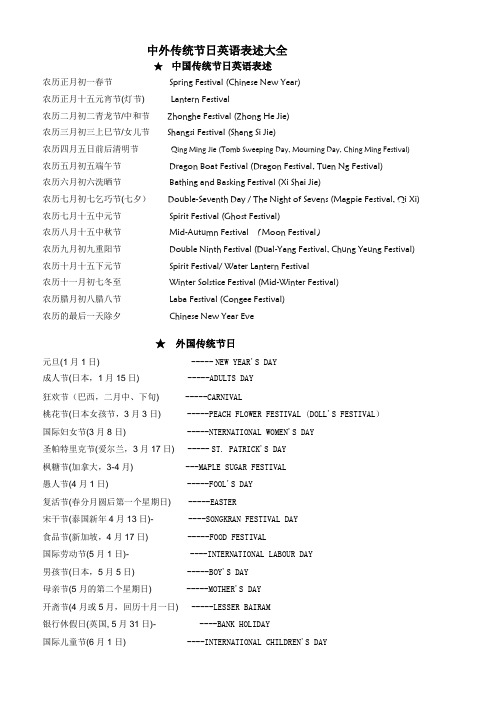
中外传统节日英语表述大全★中国传统节日英语表述农历正月初一春节Spring Festival (Chinese New Year)农历正月十五元宵节(灯节)Lantern Festival农历二月初二青龙节/中和节Zhonghe Festival (Zhong He Jie)农历三月初三上巳节/女儿节Shangsi Festival (Shang Si Jie)农历四月五日前后清明节Qing Ming Jie (Tomb Sweeping Day, Mourning Day, Ching Ming Festival)农历五月初五端午节Dragon Boat Festival (Dragon Festival, Tuen Ng Festival)农历六月初六洗晒节Bathing and Basking Festival (Xi Shai Jie)农历七月初七乞巧节(七夕)Double-Seventh Day / The Night of Sevens (Magpie Festival, Qi Xi) 农历七月十五中元节Spirit Festival (Ghost Festival)农历八月十五中秋节Mid-Autumn Festival (Moon Festival)农历九月初九重阳节Double Ninth Festival (Dual-Yang Festival, Chung Yeung Festival) 农历十月十五下元节Spirit Festival/ Water Lantern Festival农历十一月初七冬至Winter Solstice Festival (Mid-Winter Festival)农历腊月初八腊八节Laba Festival (Congee Festival)农历的最后一天除夕Chinese New Year Eve★外国传统节日元旦(1月1日) -----NEW YEAR'S DAY成人节(日本,1月15日) -----ADULTS DAY狂欢节(巴西,二月中、下旬) -----CARNIVAL桃花节(日本女孩节,3月3日)-----PEACH FLOWER FESTIVAL (DOLL'S FESTIVAL)国际妇女节(3月8日) -----NTERNATIONAL WOMEN'S DAY圣帕特里克节(爱尔兰,3月17日)-----ST. PATRICK'S DAY枫糖节(加拿大,3-4月) ---MAPLE SUGAR FESTIVAL愚人节(4月1日) -----FOOL'S DAY复活节(春分月圆后第一个星期日)-----EASTER宋干节(泰国新年4月13日)-----SONGKRAN FESTIVAL DAY食品节(新加坡,4月17日) -----FOOD FESTIVAL国际劳动节(5月1日)- ----INTERNATIONAL LABOUR DAY男孩节(日本,5月5日) -----BOY'S DAY母亲节(5月的第二个星期日) -----MOTHER'S DAY开斋节(4月或5月,回历十月一日) -----LESSER BAIRAM银行休假日(英国, 5月31日)- ----BANK HOLIDAY国际儿童节(6月1日) ----INTERNATIONAL CHILDREN'S DAY父亲节(6月的第三个星期日) -----FATHER'S DAY端午节(阴历5月5日)- ----DRAGON BOAT FESTIVAL仲夏节(北欧6月)- ----MID-SUMMER DAY古尔邦节(伊斯兰节,7月下旬)- ----CORBAN筷子节(日本,8月4日) -----CHOPSTICS DAY中秋节(阴历8月15日)- ----MOON FESTIVAL教师节(中国,9月10日) -----TEACHER'S DAY敬老节(日本,9月15日)- ----OLD PEOPLE'S DAY啤酒节(德国十月节,10月10日)-----OKTOBERFEST南瓜节(北美10月31日)- ----PUMPKIN DAY鬼节(万圣节除夕,10月31日夜)-----HALLOWEEN万圣节(11月1日)-----HALLOWMAS感恩节(美国,11月最后一个星期四)- ----THANKSGIVING护士节(12月12日)- ----NRUSE DAY圣诞除夕(12月24日)-----CHRISTMAS EVE圣诞节(12月25日) ----CHRISTMAS DAD节礼日(12月26日) -----BOXING DAY新年除夕(12月31日) -----NEW YEAR'S EVE(a bank holiday in many countries)★其它活动节日世界消费者权益日(3月15日) -----WORLD CONSUMER RIGHT DAY世界水日(3月22日) -----WORLD WATER DAY世界卫生日(4月7日) ----WORLD HEALTH DAY世界地球日(4月22日) -----WORLD EARTH DAY世界住房日(十月第一个星期一) -----WORLD HOUSING DAY国际秘书节(4月25日)- ----INTERNATIONAL SECRETARY DAY国际红十字日(5月8日) -----INTERNATIONAL RED-CROSS DAY国际护士节(5月12日) -----INTERNATIONAL NURSE DAY世界电信日(5月17日)- ---WORLD TELECOMMUNICATIONS DAY世界无烟日(5月31日) ----WORLD NO-SMOKING DAY世界环境日(6月5日) ----WORLD ENVIRONMENT DAY世界人口日(7月11日) -----WORLD POPULATION DAY世界旅游日(9月27日) ----WORLD TOURISM DAY世界邮政日(10月9日)- ----WORLD POST DAY世界粮食日(10月16日)- ----WORLD GRAIN DAY世界爱滋病日(12月1日)- ----WORLD AIDS DAY世界残疾日(12月3日)- --WORLD DISABLED DAY。
中元节的风俗450字左右作文

中元节的风俗450字左右作文英文回答:The Mid-Autumn Festival, also known as Zhong Yuan Jie in Chinese, is a traditional festival celebrated by Chinese people around the world. It falls on the 15th day of the8th month in the Chinese lunar calendar, which is usually in September or early October in the Gregorian calendar.During the Mid-Autumn Festival, people gather withtheir families to appreciate the full moon and eat mooncakes. Mooncakes are a traditional Chinese pastryfilled with lotus seed paste, red bean paste, or salted egg yolk. They are often given as gifts to friends and family members as a symbol of reunion and good wishes.Another popular custom during the Mid-Autumn Festival is carrying brightly lit lanterns and parading through the streets. This tradition is especially popular among children, who enjoy the colorful and decorative lanterns.In addition to lantern parades, there are also various cultural performances and activities held in many communities to celebrate the festival.The Mid-Autumn Festival is also a time for people topay respects to their ancestors. Many families visit the graves of their loved ones to clean the tombs, offer food and incense, and pay their respects. This is based on the belief in Chinese culture that the spirits of the deceased return to the human world during the festival.Overall, the Mid-Autumn Festival is a time for family reunions, expressing gratitude, and celebrating the harvest. It is a cherished tradition that has been passed down through generations and continues to be an important partof Chinese culture.中文回答:中元节,又称中秋节,是中国人民世界各地庆祝的传统节日。
用英语表示的中国的节日
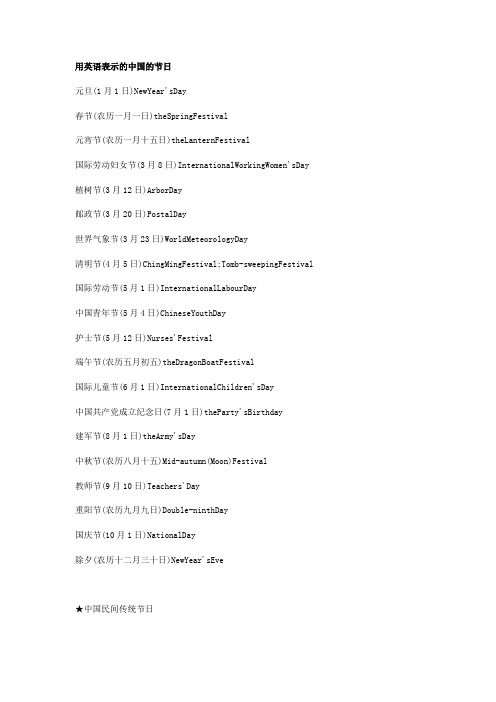
用英语表示的中国的节日元旦(1月1日)NewYear'sDay春节(农历一月一日)theSpringFestival元宵节(农历一月十五日)theLanternFestival国际劳动妇女节(3月8日)InternationalWorkingWomen'sDay 植树节(3月12日)ArborDay邮政节(3月20日)PostalDay世界气象节(3月23日)WorldMeteorologyDay清明节(4月5日)ChingMingFestival;Tomb-sweepingFestival 国际劳动节(5月1日)InternationalLabourDay中国青年节(5月4日)ChineseYouthDay护士节(5月12日)Nurses'Festival端午节(农历五月初五)theDragonBoatFestival国际儿童节(6月1日)InternationalChildren'sDay中国共产党成立纪念日(7月1日)theParty'sBirthday建军节(8月1日)theArmy'sDay中秋节(农历八月十五)Mid-autumn(Moon)Festival教师节(9月10日)Teachers'Day重阳节(农历九月九日)Double-ninthDay国庆节(10月1日)NationalDay除夕(农历十二月三十日)NewYear'sEve★中国民间传统节日春节 -- The Spring Festival路神生日 -- Magical birthday of road元宵节 -- Lantern Festival春龙节 (龙抬头) -- The dragon saves spring (the dragon raises head) 寒食节 -- The cold food day is saved清明节 -- Qingming Festival立夏节 -- Beginning of Summer is saved端午节 -- The Dragon Boat Festival天贶节 -- The day present saves翻经节 -- translates after festival姑姑节 -- the father's sister festival火把节 -- Torch Festival七夕 -- The seventh evening of the seventh moon盂兰盆节 -- The jar orchid basin saves中元节 -- is hit by yuan of festival鬼节 -- spirit festival地藏节 -- The field hides festival中秋节 -- The Mid-autumn Festival重阳节 -- Double Nineth Festival祭祖节 -- Offer a sacrifice to ancestors section冬节 -- Winter is saved阔时节 -- Broad season腊八节 -- The eighth day of the twelfth lunar month is saved小年 -- Festival that falls on the 23rd or 24th of the twelfth month of the lunar year除夕 -- New Year's Eve回族节日 -- The Hui nationality festival★其它活动节日世界消费者权益日(3月15日)-----WORLD CONSUMER RIGHT DAY世界水日(3月22日)-----WORLD WATER DAY世界卫生日(4月7日)-----WORLD HEALTH DAY世界地球日(4月22日)-----WORLD EARTH DAY世界住房日(十月第一个星期一)-----WORLD HOUSING DAY国际秘书节(4月25日)-----INTERNATIONAL SECRETARY DAY国际红十字日(5月8日)-----INTERNATIONAL RED-CROSS DAY国际护士节(5月12日)-----INTERNATIONAL NURSE DAY世界电信日(5月17日)-----WORLD TELECOMMUNICATIONS DAY世界无烟日(5月31日)-----WORLD NO-SMOKING DAY世界环境日(6月5日)-----WORLD ENVIRONMENT DAY世界人口日(7月11日)-----WORLD POPULATION DAY世界旅游日(9月27日)-----WORLD TOURISM DAY世界邮政日(10月9日)-----WORLD POST DAY世界粮食日(10月16日)-----WORLD GRAIN DAY世界爱滋病日(12月1日)-----WORLD AIDS DAY世界残疾日(12月3日)-----WORLD DISABLED。
“中元节”英语怎么说?
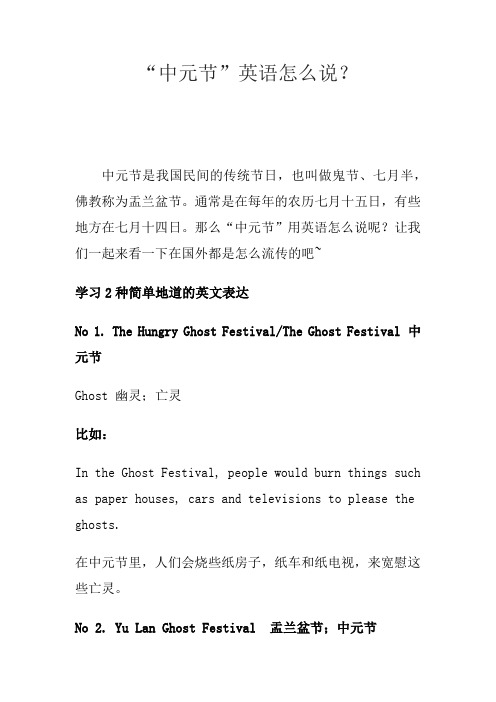
中元节是我国民间的传统节日,也叫做鬼节、七月半,佛教称为盂兰盆节。通常是在每年的农历七月十五日,有些地方在七月十四日。那么“中元节”用英语怎么说呢?让我们一起来看一下在国外都是怎么流传的吧~
学习2种简单地道的英文表达
No 1. The Hungry Ghost Festival/The Ghost Festival 中元节
No 2. Yu Lan Ghost Festival盂兰盆节;中元节
比如:
The tradition of Yu Lan Ghost Festival is timeless.
中元节的传统历史悠久。
口语练习
欢迎把下面的话翻译成英文喔:)
我以前在中元节时都会待在家里。
Ghost 幽灵;亡灵
比如:
In the Ghost Festival, people would burn things such as paper houses, cars and televisions to please the ghosts.
在中元节里,人们会烧些纸房子,纸车和
中国传统节日英文演讲稿
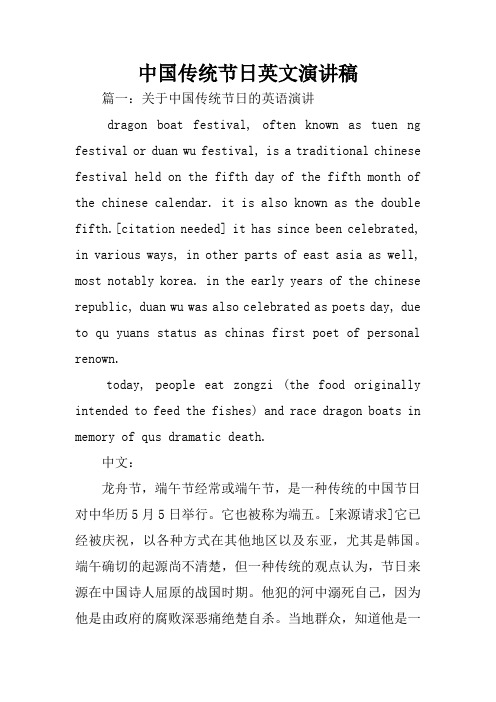
中国传统节日英文演讲稿篇一:关于中国传统节日的英语演讲dragon boat festival, often known as tuen ng festival or duan wu festival, is a traditional chinese festival held on the fifth day of the fifth month of the chinese calendar. it is also known as the double fifth.[citation needed] it has since been celebrated, in various ways, in other parts of east asia as well, most notably korea. in the early years of the chinese republic, duan wu was also celebrated as poets day, due to qu yuans status as chinas first poet of personal renown.today, people eat zongzi (the food originally intended to feed the fishes) and race dragon boats in memory of qus dramatic death.中文:龙舟节,端午节经常或端午节,是一种传统的中国节日对中华历5月5日举行。
它也被称为端五。
[来源请求]它已经被庆祝,以各种方式在其他地区以及东亚,尤其是韩国。
端午确切的起源尚不清楚,但一种传统的观点认为,节日来源在中国诗人屈原的战国时期。
他犯的河中溺死自己,因为他是由政府的腐败深恶痛绝楚自杀。
当地群众,知道他是一个好人,决定投身到河里的鱼的食物,饲料,以防止吃屈原的尸体他们。
2024中元节话题英语作文通用大全
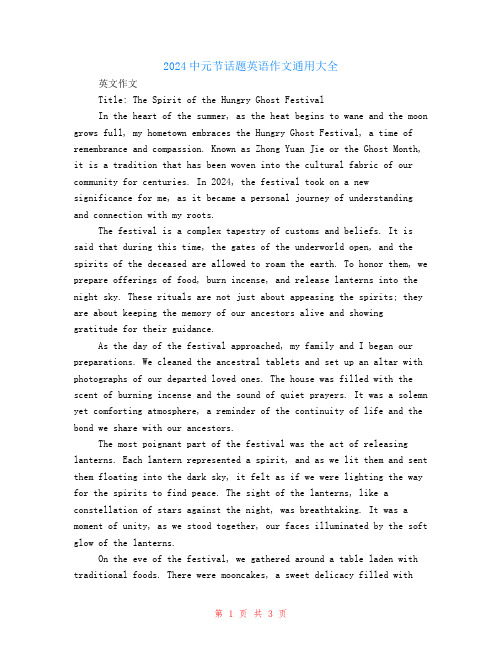
2024中元节话题英语作文通用大全英文作文Title: The Spirit of the Hungry Ghost FestivalIn the heart of the summer, as the heat begins to wane and the moon grows full, my hometown embraces the Hungry Ghost Festival, a time of remembrance and compassion. Known as Zhong Yuan Jie or the Ghost Month, it is a tradition that has been woven into the cultural fabric of our community for centuries. In 2024, the festival took on a newsignificance for me, as it became a personal journey of understanding and connection with my roots.The festival is a complex tapestry of customs and beliefs. It is said that during this time, the gates of the underworld open, and the spirits of the deceased are allowed to roam the earth. To honor them, we prepare offerings of food, burn incense, and release lanterns into the night sky. These rituals are not just about appeasing the spirits; they are about keeping the memory of our ancestors alive and showinggratitude for their guidance.As the day of the festival approached, my family and I began our preparations. We cleaned the ancestral tablets and set up an altar with photographs of our departed loved ones. The house was filled with the scent of burning incense and the sound of quiet prayers. It was a solemn yet comforting atmosphere, a reminder of the continuity of life and the bond we share with our ancestors.The most poignant part of the festival was the act of releasing lanterns. Each lantern represented a spirit, and as we lit them and sent them floating into the dark sky, it felt as if we were lighting the way for the spirits to find peace. The sight of the lanterns, like a constellation of stars against the night, was breathtaking. It was a moment of unity, as we stood together, our faces illuminated by the soft glow of the lanterns.On the eve of the festival, we gathered around a table laden with traditional foods. There were mooncakes, a sweet delicacy filled withlotus seed paste and egg yolk, and various other dishes that held special significance for our family. As we ate, we shared stories of our ancestors, recalling their wisdom and the lessons they had taught us. It was a time of reflection and learning, a chance to pass on the values that had been instilled in us.In 2024, the Hungry Ghost Festival was more than just a cultural event; it was a personal experience that deepened my understanding of my heritage and the traditions that shape my identity. It was a time of reflection, connection, and a renewed commitment to honoring the memory of those who came before us.中文翻译标题:中元节的精神在盛夏时节,随着热度开始消退,月亮变得圆满,我的家乡迎来了中元节,这是一个纪念和同情的时刻。
双语:中国四大鬼节之一七月半或中元节英语介绍

双语:中国四大鬼节之一七月半或中元节英语介绍万圣节是西方的鬼节,那你知道中国的四大鬼节是那四个节日吗?今天介绍中国四大鬼节之一七月半,俗称鬼节,又称中元节或盂兰盆节。
民间有阳间过元宵节阴间过鬼节的传说,因此鬼节是阴间最大的节日。
你知道怎样向外国朋友介绍中国的鬼节吗?随小编一起来看看吧!There are many ghosts in Chinese culture; they have been worshipped by the Chinese for a few thousand years. Even Confucius said, "Respect ghosts and gods, but keep away from them."While many people believe in ghosts, there are others who don't. The Chinese people often say, "If you believe it, there will be, but if you don't, there will not."The ghost is a classical image in Chinese culture, i.e., the young woman whose face is covered by long black hair, who dies due to misfortune, then comes back for revenge.The word "ghost" for many Chinese conjures up similar images. Often the ghost is a beautiful young woman. The sudden switch from a beautiful girl to a frightening ghost is striking. The seemingly fragile, helpless and beautiful women turning into fearless killers is a favorite theme among Asian movie directors and storywriters.Chinese Ghost FestivalJust as the West features Halloween for ghosts and ghouls, the Chinese have a holiday to honor the departed spirits of the underworld -- the Chinese Ghost Festival. It is said that ghosts roam the world every year for one lunar month. In some areas of China, visitors can see small roadside fires, where believers burn paper money and other offerings to appease the restless spiritsthat have temporarily been released from Hades.The Chinese Ghost Festival is also called "Half July" (Lunar). It is a popular occasion celebrated throughout China on the 15th day of the seventh lunar month.Historically, families offer sacrifices of the newly harvested grain to departed ancestors on this day, which also coincides with the Buddhist Ullambana (Deliverance) Festival and the Taoist Chinese Ghost Festival. Since each of these traditions in some way honors the spirits of the departed, the seventh lunar month has come to be known as "Ghost Month" and is a time when the "Good Brethren" (ghosts from the underworld) come back to earth to feast on the victuals offered by the living. Over time the Ullambana Festival and Ghost Festival have melded together to become the present-day Chung Yuan Putu or "Mid-origin Passage to Universal Salvation."The Chinese believe that the dead become ghosts between heaven and earth. Spirits without descendants to care for them are summoned during the Ghost Festival so that they may also enjoy the warmth of life among the living. This custom -- an extension of the traditional Chinese ethic of "universal love" -- has been woven together with the didactic legend, "Moginlin Saving His Mother From Hades." It lends the Ghost Festival a positive spin as a time for remembering the importance of filial piety. People now have inherited releasing river light as an important activity. It is said that river light can comfort and warm homeless ghosts.Burial of the deadIn the past, the burial of the dead (cremation is traditionally uncommon) was a matter taken very seriously in Chinese society. Improper funeral arrangements could wreak ill fortune anddisaster upon the family of the deceased.To a certain degree, Chinese funeral rites and burial customs were determined by the age of the deceased, the manner of his/her death, his/her status and position in society and his/her marital status.According to Chinese custom, an older person should not show respect to someone younger. Thus, if the deceased was a young bachelor his body could not be brought home but was left at the funeral parlor and the parents could not offer prayers for their son. Since the deceased was unmarried he had no children to perform the rites, which was why the body did not enter the family home. If a baby or child died no funeral rites were performed since respect could not be shown to a younger person. The child was, therefore, buried in silence.Chinese funeral rites for an elderly person must follow the prescribed form and convey the relevant rites that befit the person.Chinese thoughts towards life after deathYoung women in traditional societies are rarely endowed with much power, and malignant powers are only summoned with keen hatred and a desire for revenge. The more badly one is wronged, the more powerful he or she becomes after death.Such beliefs are closely related to the Chinese attitude towards life after death -- a combination of superstition and religion.Buddhist doctrines about the life cycle led to many vivid descriptions in Chinese legends about karma. For example, Buddhism forbids murder; in folklore, people believe that butchers return in the next life in the form of the animals they killed. People who treat others badly or do cruel things becomepathetic beings, suffering for the rest of the next life.Besides retribution in lives to come, vivid and complicated descriptions of heaven and hell also exist in Chinese legends.People have imaginatively transfigured their real life experiences into visions of the unknown world. The Chinese legendary hell, for example, is governed by a king in a completely bureaucratic system.The king of the underground takes charge of people's lives, keeping a book that spells out the exact time of everybody's death.In the classic novel, Pilgrimage to the West, the Monkey King Wu Kong goes to visit the king of hell and reads the book of death. He looks for his own name and erases it, ensuring himself everlasting life.。
高中英语传统文化高频词汇 整理
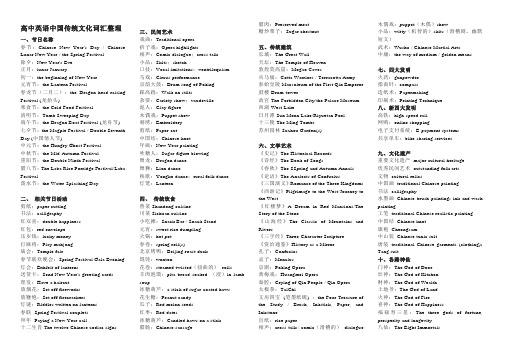
高中英语中国传统文化词汇整理一、节日名称春节:Chinese New Year's Day / Chinese Lunar New Year / the Spring Festival除夕:New Year's Eve正月:lunar January初一:the beginning of New Year元宵节:the Lantern Festival春龙节(二月二):the Dragon-head-raising Festival (龙抬头)寒食节:the Cold Food Festival清明节:Tomb Sweeping Day端午节:the Dragon Boat Festival (龙舟节) 七夕节:the Magpie Festival / Double Seventh Day (中国情人节)中元节:the Hungry Ghost Festival中秋节:the Mid-Autumn Festival重阳节:the Double Ninth Festival腊八节:The Laba Rice Porridge Festival/Laba Festival泼水节:the Water-Splashing Day二、相关节日活动剪纸:paper cutting书法:calligraphy红双喜:double happiness红包:red envelope压岁钱:lucky money打麻将:Play mahjong庙会:Temple fair春节联欢晚会:Spring Festival Gala Evening 灯会:Exhibit of lanterns送贺卡:Send New Year's greeting cards理发:Have a haircut放烟花:Set off fireworks放鞭炮:Set off firecrackers灯谜:Riddles written on lanterns春联Spring Festival couplets拜年Paying a New Year call十二生肖 The twelve Chinese zodiac signs 三、民间艺术戏曲:Traditional opera折子戏:Opera highlights相声:Comic dialogue;cross talk小品:Skits;sketch口技:Vocal imitations;ventriloquism马戏:Circus performance京韵大鼓:Drum song of Peking踩高跷:Walk on stilts杂耍:Cariety show;vaudeville泥人:Clay figure木偶戏:Puppet show刺绣:Embroidery剪纸:Paper-cut中国结:Chinese knot年画:New Year painting吹糖人:Sugar-figure blowing舞龙:Dragon dance舞狮:Lion dance秧歌:Yongko dance;rural folk dance灯笼:Lantern四、传统饮食鲁菜Shandong cuisine川菜Sichuan cuisine小吃摊:Snack Bar / Snack Stand元宵:sweet rice dumpling火锅:hot pot春卷:spring roll(s)北京烤鸭:Beijing roast duck馄饨:wonton花卷:steamed twisted(扭曲的)rolls羊肉泡馍:pita bread soaked (浸)in lambsoup冰糖葫芦:a stick of sugar-coated haws花生糖:Peanut candy瓜子:Red melon seeds红枣:Red dates冰糖葫芦:Candied haws on a stick腊肠:Chinese sausage腊肉:Preserved meat糖炒栗子:Sugar chestnut五、传统建筑长城:The Great Wall天坛:The Temple of Heaven敦煌莫高窟:Mogao Caves兵马俑:Cotta Warriors / Terracotta Army泰始皇陵Mausoleum of the First Qin Emperor鼓楼Drum-tower故宫The Forbidden City/the Palace Museum西湖West Lake日月潭Sun Moon Lake/Riyuetan Pool十三陵The Ming Tombs苏州园林Suzhou Garden(s)六、文学艺术《史记》The Historical Records《诗经》The Book of Songs《春秋》The SSpring and Autumn Annals《论语》The Analects of Confucius《三国演义》Romance of the Three Kingdoms《西游记》Pilgrimage to the West/Journey tothe West《红楼梦》A Dream in Red Mansions/TheStory of the Stone《山海经》The Classic of Mountains andRivers《三字经》Three-Character Scripture《资治通鉴》History as a Mirror孔子:Confucius孟子:Mencius京剧:Peking Opera黄梅戏:Huangmei Opera秦腔:Crying of Qin People / Qin Opera太极拳:TaiChi文房四宝(笔墨纸砚) :the Four Treasure ofthe Study / Brush, Inkstick, Paper, andInkstone宣纸:rice paper相声:cross-talk / comic(滑稽的)dialogue木偶戏:puppet(木偶)show小品:witty(机智的)skits(滑稽剧。
中国传统节日及活动英译

中国传统节日及活动英译新年-New Year’s Day春节-Spring Festival三八节-International Working Women’s Day五一节-May Day五四节-Chinese Youth Day六一节-International Children’s Day八一建军节-Army Day中国共产党成立纪念日-Aniversary of the Founding of the Communist Party of China国庆节-National Day元宵节The Lantern Festival清明节The Tomb-sweeping Festival端午节The Dragon Boat Festival中秋节The Mid-Autumn Festival重阳节The Double Ninth Day七夕节The Double Seventh Day西方节日New Year's Day 元旦节、新年Easter Sunday,Easter 复活节Epiphany,Twelfth Day 主显节day of obligation 每人需停止工作参加礼拜的日子Christmas 圣诞节Christmas Eve 圣诞前夕New Year‘s Eve 新年前夕Easter 复活节狂欢节CARNIVAL愚人节APRIL FOOL‘S DAY复活节EASTER食品节FOOD FESTIVAL国际劳动节INTERNATIONAL LABOUR DAY男孩节BOY‘S DAY母亲节MOTHER‘S DAY开斋节LESSER BAIRAM银行休假日BANK HOLIDAY国际儿童节INTERNATIONAL CHILDREN‘S DAY父亲节FATHER‘S DAY 教师节TEACHER‘S DAY感恩节THANKSGIVINGChristmas 圣诞节Christmas Eve 圣诞前夕New Year‘s Eve 新年前夕Easter 复活节All Saints‘ Day 万圣节其它活动节日世界消费者权益日--WORLD CONSUMER RIGHT DAY世界水日-----WORLD WATER DAY世界卫生日-----WORLD HEALTH DAY世界地球日-----WORLD EARTH DAY世界住房日--WORLD HOUSING DAY 国际秘书节----INTERNATIONAL SECRETARY DAY国际红十字日----INTERNATIONAL RED-CROSS DAY世界电信日----WORLD TELECOMMUNICATIONS DAY世界无烟日----WORLD NO-SMOKING DAY世界环境日----WORLD ENVIRONMENT DAY世界人口日---WORLD POPULATION DAY世界旅游日----WORLD TOURISM DAY世界邮政日----WORLD POST DAY 世界粮食日-----WORLD GRAIN DAY世界爱滋病日-----WORLD AIDS DAY世界残疾日------WORLD DISABLED DAY。
初中介绍中元节的英语作文

初中介绍中元节的英语作文{z}Title: The Mid-Autumn Festival - A Glimpse into Chinese Culture Introduction:The Mid-Autumn Festival, also known as the Moon Festival, is one of the most important traditional Chinese festivals celebrated annually.Falling on the 15th day of the eighth lunar month, this festival is an occasion filled with joy, reunion, and appreciation for the full moon.Celebration and Traditions:During the Mid-Autumn Festival, families gather to enjoy a night under the bright and round moon.The festival is often associated with mooncakes, a type of traditional Chinese pastry filled with various ingredients such as lotus seed paste, red bean paste, and egg yolk.Sharing mooncakes with friends and family symbolizes unity and togetherness.Lanterns also play a significant role in the celebration of the Mid-Autumn Festival.People hang lanterns in various shapes and colors in their homes, and children carry lanterns while strolling under the moonlight.The lanterns are thought to light the way for the moon deity, Chang"e, who is said to ascend to the moon on this day.My Experience:As a child, I vividly remember the excitement surrounding the Mid-Autumn Festival.My family would gather to eat mooncakes, playtraditional games, and admire the full moon.The festival was not only a time for enjoyment but also a platform to learn about our cultural heritage.Conclusion:The Mid-Autumn Festival is a significant event in Chinese culture, symbolizing reunion, joy, and gratitude.It is a time when families come together to appreciate the beauty of the full moon, share mooncakes, and engage in traditional activities.This festival serves as a bridge between generations, transmitting cultural values and fostering a sense of identity and belonging.。
中元节的作文
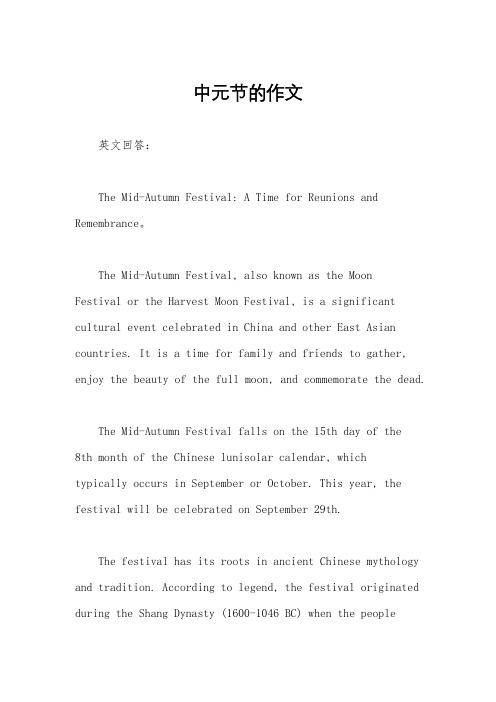
中元节的作文英文回答:The Mid-Autumn Festival: A Time for Reunions and Remembrance。
The Mid-Autumn Festival, also known as the MoonFestival or the Harvest Moon Festival, is a significant cultural event celebrated in China and other East Asian countries. It is a time for family and friends to gather, enjoy the beauty of the full moon, and commemorate the dead.The Mid-Autumn Festival falls on the 15th day of the8th month of the Chinese lunisolar calendar, whichtypically occurs in September or October. This year, the festival will be celebrated on September 29th.The festival has its roots in ancient Chinese mythology and tradition. According to legend, the festival originated during the Shang Dynasty (1600-1046 BC) when the peopleoffered sacrifices to the moon god, Chang'e. Chang'e, a beautiful goddess, was said to have stolen an elixir of immortality from her husband, Houyi, and fled to the moon.Over time, the Mid-Autumn Festival has evolved into a celebration of the harvest and a time for family reunions. Farmers would gather after the autumn harvest to enjoy the fruits of their labor and give thanks to the moon god for the bountiful harvest.Today, the Mid-Autumn Festival is still a popular tradition in China and around the world. Families and friends gather to share a meal, enjoy the full moon, and participate in various activities such as lantern-carrying, lion dancing, and folk performances.One of the most iconic symbols of the Mid-Autumn Festival is the mooncake. Mooncakes are round pastriesfilled with a variety of sweet or savory ingredients, such as lotus seed paste, red bean paste, or duck eggs. Mooncakes are often decorated with intricate designs and Chinese characters that symbolize good fortune andprosperity.Another important aspect of the Mid-Autumn Festival is the commemoration of the dead. On the eve of the festival, families visit the graves of their deceased loved ones to pay their respects and burn incense. This ritual is known as "ancestor worship" and is an integral part of Chinese culture.The Mid-Autumn Festival is a time for reflection, remembrance, and renewal. It is a reminder of the importance of family, tradition, and the cyclical nature of life. As the moon waxes and wanes, so too do our lives. But just as the moon always returns, so too do our hopes and dreams.中文回答:中秋佳节,团圆与怀念。
中元节 英语介绍
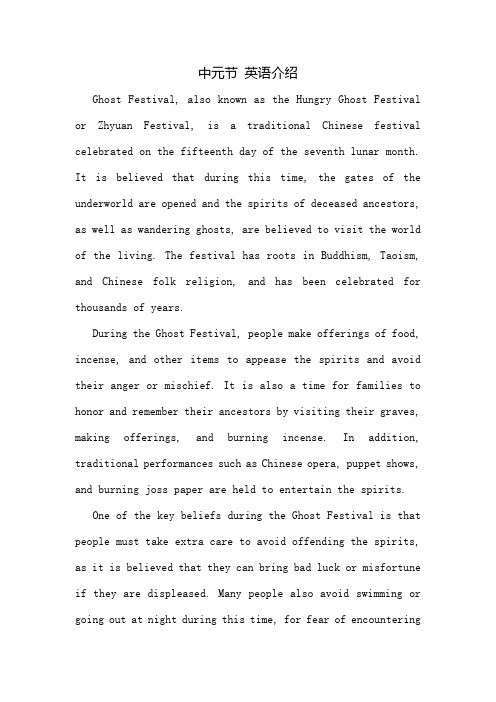
中元节英语介绍Ghost Festival, also known as the Hungry Ghost Festival or Zhyuan Festival, is a traditional Chinese festival celebrated on the fifteenth day of the seventh lunar month. It is believed that during this time, the gates of the underworld are opened and the spirits of deceased ancestors, as well as wandering ghosts, are believed to visit the world of the living. The festival has roots in Buddhism, Taoism, and Chinese folk religion, and has been celebrated for thousands of years.During the Ghost Festival, people make offerings of food, incense, and other items to appease the spirits and avoid their anger or mischief. It is also a time for families to honor and remember their ancestors by visiting their graves, making offerings, and burning incense. In addition, traditional performances such as Chinese opera, puppet shows, and burning joss paper are held to entertain the spirits.One of the key beliefs during the Ghost Festival is that people must take extra care to avoid offending the spirits, as it is believed that they can bring bad luck or misfortune if they are displeased. Many people also avoid swimming or going out at night during this time, for fear of encounteringvengeful or wandering spirits.Overall, the Ghost Festival is a time for family, remembrance, and showing respect to the deceased. It is a significant and traditional festival in Chinese culture that reflects the importance of filial piety and respect for ancestors and spirits.。
- 1、下载文档前请自行甄别文档内容的完整性,平台不提供额外的编辑、内容补充、找答案等附加服务。
- 2、"仅部分预览"的文档,不可在线预览部分如存在完整性等问题,可反馈申请退款(可完整预览的文档不适用该条件!)。
- 3、如文档侵犯您的权益,请联系客服反馈,我们会尽快为您处理(人工客服工作时间:9:00-18:30)。
中元节活动英语
【篇一:鬼节英语如何翻译?】
“鬼节”英文翻译今天是什么日子?相信不用小编说大家都知道,今
天是中元节,又称鬼节和盂兰盆节,在湖湘川陕一带也有称月半节的。
对于汉语的叫法我想大家都不陌生,那你们知道“鬼节”翻译成
英文怎么说嘛?想知道就听新语丝翻译一一为你讲解吧。
关于鬼节用英文如何表达?我们或许会讲在国外鬼节叫halloween,即万圣节,那么中国鬼节是不是就应该是chinese halloween了?
其实这样表达也是可以的,不过一般我们把中国鬼节翻译成英文是dead spirit festival。
而中元节英语是不是和鬼节英语一样呢?其实不然,中元节我们常
用the ghost festival和hungry ghost festival 表达。
是不是很奇怪,“鬼节”和“中元节”不是指的同一个吗?为何英语表达不一样呢?那我们鬼节英语到底怎么说呢?dead spirit festival?或者说
chinese halloween?hungry ghost festival?也或者是the ghost festival?其实啊!这三种都是可以的,不过你要想表达的让老外明
白点的话,建议说 chinese halloween。
因为中元节只有中国人才
这样说,甚至一般我们都不会这样说。
接下来合同翻译再与大家分享个关于鬼节的英文介绍及翻译吧!详
情如下: the hungry ghost festival is celebrated on the 15th
day of the seventh lunar month.
中元节在农历七月十五日。
the origin of the hungry ghost festival and the ghost month in china is uncertain. cultures in asia from india to cambodia to japan share similar beliefs about the month, and these
traditions seem to date from before buddha.
中元节是否起源于中国并不确定。
关于该节日的文化在一些亚洲国
家诸如印度、柬埔寨、日本都信奉着相似的信仰,似乎这些传统都
起源于佛教。
according to taoism, the gates of hell are opened on the first
day of the seventh month, and hungry ghosts are released to
find food or to take revenge on those who have behaved badly according to taoist records.
根据道教说法,农历七月的第一天地狱之门将打开,饥饿的鬼魂得
以释放去寻找食物或报复那些道家记载的作恶多端的人。
family members offer prayers to their deceased relatives, offer food and drink and burn hell bank notes and other forms of
joss paper.
家庭成员向已故的亲人祈祷,送上祝福,奉上食物和饮料,烧一些
诸如冥币这样的纸钱给他们。
【篇二:中国四大鬼节之一七月半或中元节英语介绍】
中国四大鬼节之一七月半或中元节英语介绍
万圣节是西方的鬼节,那你知道中国的四大鬼节是那四个节日吗?
今天介绍中国四大鬼节之一七月半,俗称鬼节,又称中元节或盂兰
盆节。
民间有阳间过元宵节阴间过鬼节的传说,因此鬼节是阴间最
大的节日。
你知道怎样向外国朋友介绍中国的鬼节吗?随小编一起
来看看吧!
there are many ghosts in chinese culture; they have been worshipped by the chinese for a few thousand years. even confucius said, respect ghosts and gods, but keep away from them.。
